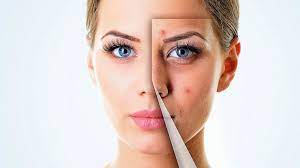

It always happens when you have a “special” event planned and you want to look fabulous. A pimple pops up on your face. And it doesn’t just happen to teen-agers, it happens to some adults. Even up to their Middle Ages. So, what do we do?
The first thing is to understand what causes acne. Acne is the name given to the process that occurs when the oil glands in your skin get clogged up. Because the skin contains oil glands, known as “sebaceous glands.” That produce a special oil. This oil helps keep your skin smooth and healthy and protects your skin from “dirt,” “bacteria” and “dryness.”
The oil glands are working overtime. When this happens, the glands produce more oil than the oil ducts can handle. The passageways that transport the oil to the surface of your skin can’t handle. When this happens the excess oil begins collecting under the skin surface, and there you have the beginning of pimples.
If this stays under the surface of your skin, it is known as a “whitehead.” If it enlarges and pushes out to the surface of your skin, it is known as a “blackhead.”
The dark color of blackheads are caused by a buildup of “melanin,” the pigment in the skin is responsible for your skin color and for suntans.
To help get rid of those “pimple.” a few tips to follow:
- Wash your face with soap and water once or twice a day. Not perfumed or scented soaps and stay away from harsh deodorant soaps. Because they can strip your face of valuable oils that actually protect your skin, and can lead to more pimples. Use a mild antibacterial soap that will help cleanse your skins without damaging it.
- Use very little makeup, because when you use to much it often clogs the pores in your skin, leading to clogged oil glands and pimples. Try using a water-based type makeup rather than an oil-based makeup.
- Most people do, but don’t pick at your pimples. Because this doesn’t speed up the process and can lead to “scaring” that wouldn’t have occurred.
- Avoid certain foods and drinks that may trigger your outbreaks such as chocolate and caffeine.
- Drink plenty of water, up to eight glasses a day. This helps “flush out” your system to prevent pimple formation. Water also helps keep your skin, hair, nails, and intestines healthy.
- If you are taking birth control pills, check with your doctor to make sure that what you are taking don’t have acne as a side effect.
- If you are taking medication, check with your doctor to make sure that what you are taking don’t have acne as a side effect.
- Try using over the counter “anti-acne” creams. That contain ingredients such as “benzoyl peroxide,” “sulfur” or “salicylic acid,” they are helpful in reducing acne flare-ups.
- Avoid stressful situations that might trigger your acne outbreaks.
- If your acne gets serious, you need to see a dermatologist.
